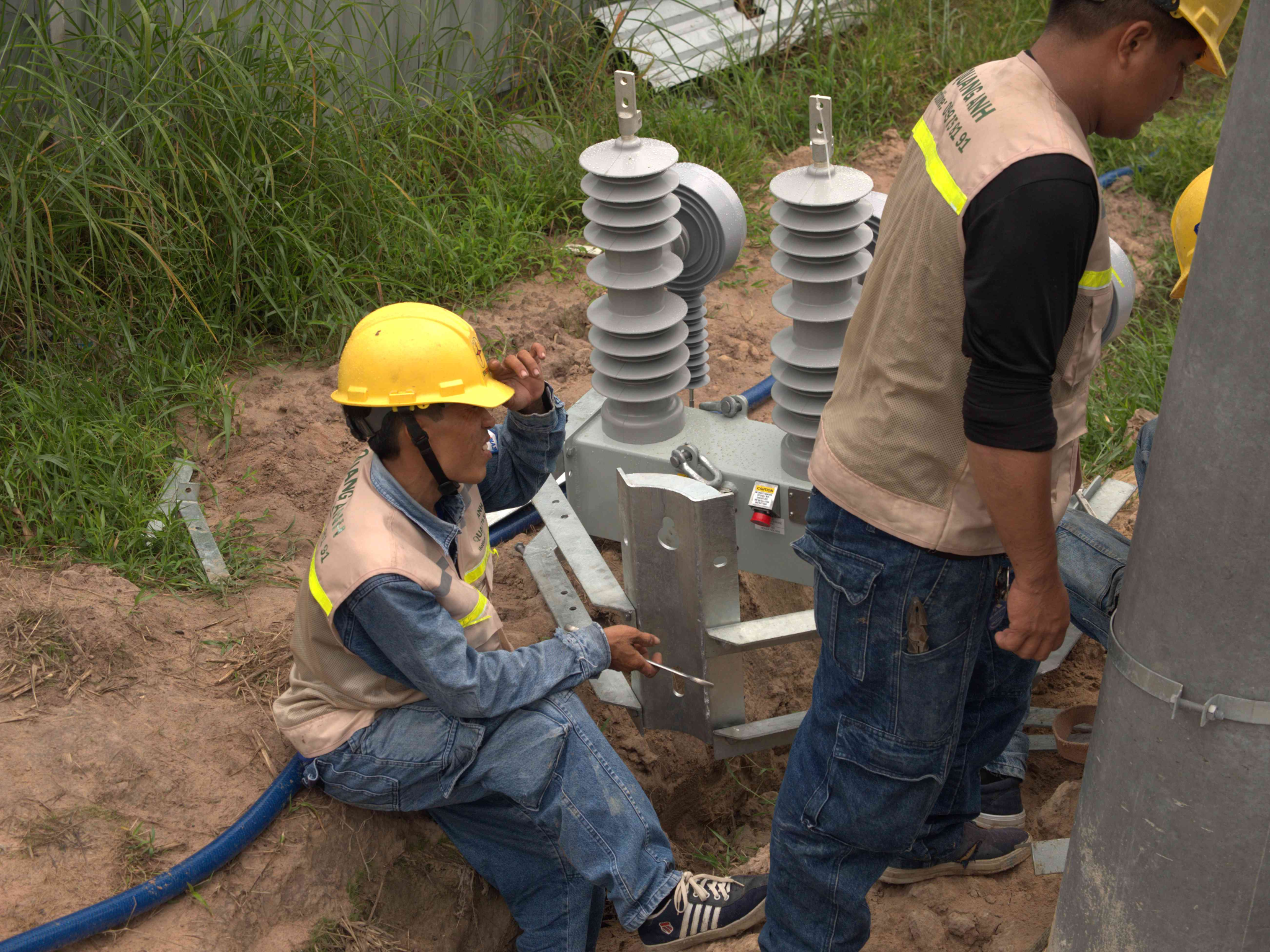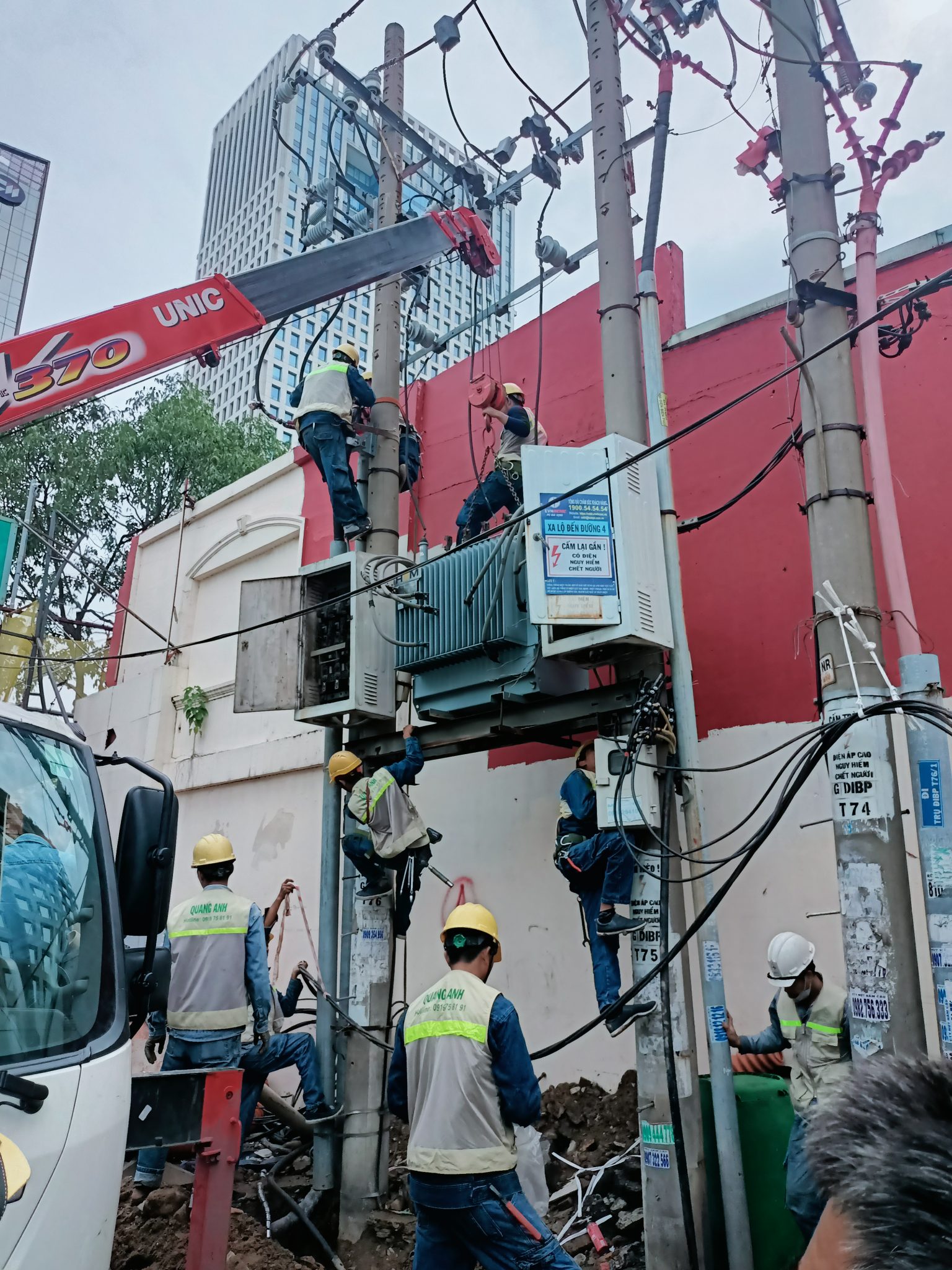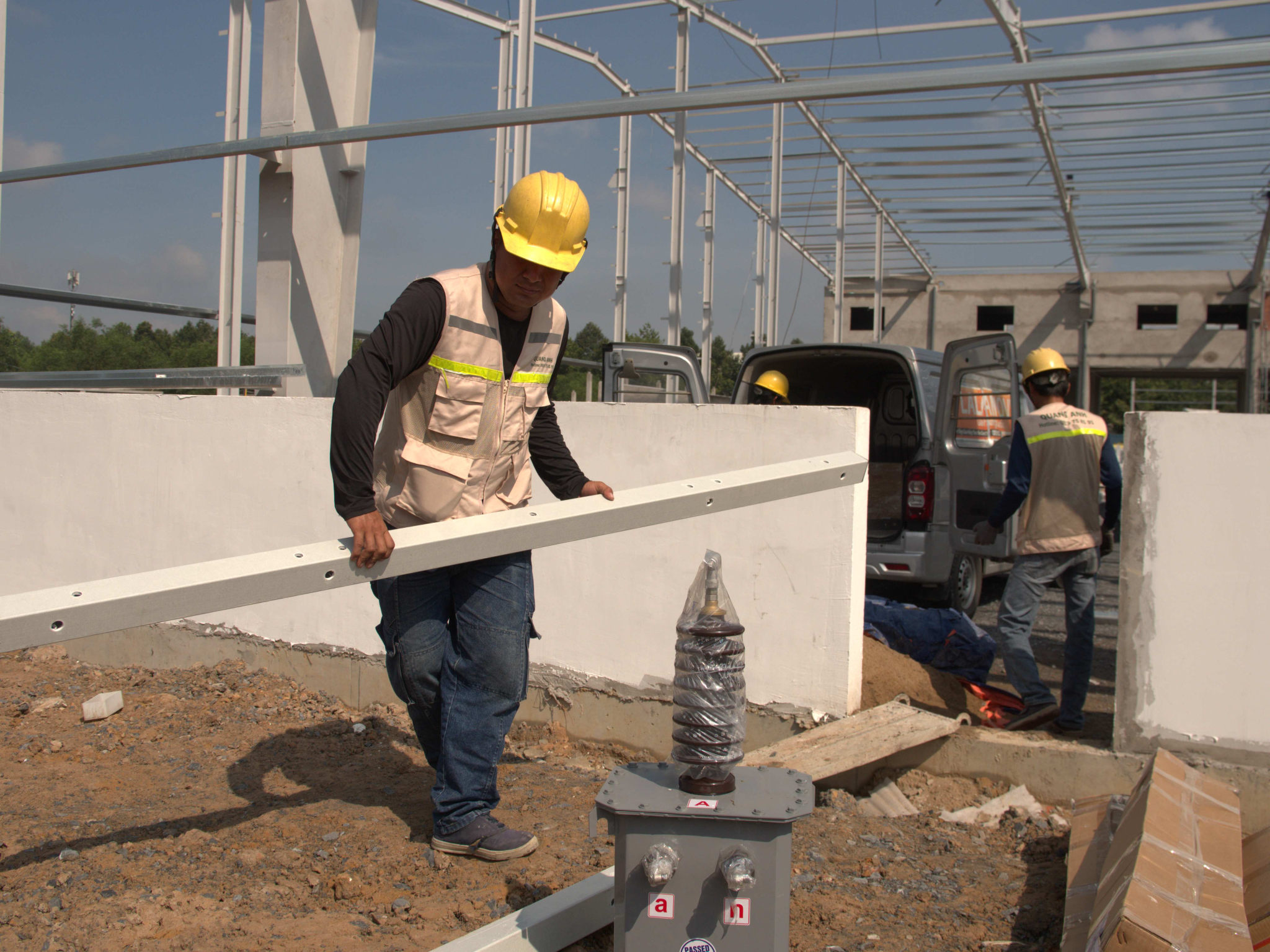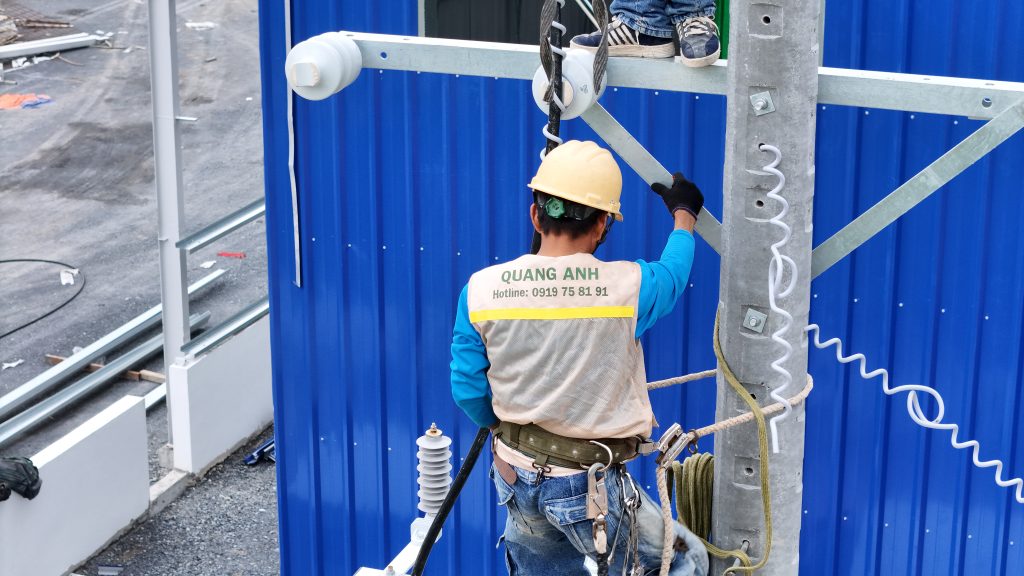News
Industrial Electrical Construction: Process and Related Services
Electrical construction in industry is the process of designing, installing, and managing electrical systems in factories and industrial zones to ensure stable and safe operation.
Overview of Industrial Electrical Construction
Industrial electrical construction includes designing and installing electrical systems that meet the needs of production facilities. These systems include electrical equipment, power lines, substations, electric cabinets, control systems, and automation, ensuring industrial electrical safety and energy efficiency.
Industrial electrical construction is an essential engineering field, involving the design, installation, and maintenance of industrial electrical systems. These systems are typically used in factories, industrial zones, and large constructions, requiring a professional construction process to ensure effectiveness and safety.
Industrial Electrical Construction Process
-
Site Survey
- The purpose of the survey is to collect detailed information about the site such as area, equipment requiring power supply, and specific electrical usage requirements.
- The information will be used to assess the electrical needs of lighting systems, air conditioning, manufacturing machines, etc.
-
Technical Drawing Design
- The drawing should clearly show all installation locations of equipment, electrical circuits, and be executed according to international standards as well as Vietnamese regulations.
-
Preparation of Equipment and Materials
- Full preparation of equipment like distribution cabinets, power cables, lighting systems, and other necessary devices.
-
Implementation of Electrical System Installation
- Heavy electrical systems include installing substations, distribution cabinets from brands like Cadivi, LS, Eaton.
- Light electrical systems include installing lighting systems, lightning protection, and building management systems.
-
Inspection, Acceptance, and Handover
- Inspection process ensures the safety of the system, no incidents, and compliance with the design drawings. Functional acceptance and equipment testing should be conducted following contract standards.
Important Technical Factors
- Ensuring electrical safety is a top criterion, including using materials and equipment that meet the standards.
- Designing energy-saving systems, such as using LED lights and high-efficiency devices.
- Regular maintenance is necessary to keep the system stable and long-lasting.
Main Electrical Systems in Industrial Electrical Construction
Main electrical systems commonly found in industrial electrical construction include:
- Heavy Electrical Systems: Substations, distribution cabinets, generators, and water pumps.
- Light Electrical Systems: Lighting systems, lightning protection, and security camera systems.
Industrial electrical construction requires a deep understanding of technology as well as strict adherence to safety regulations to ensure the system operates stably and efficiently after completion.

Industrial Electrical Construction Process
The process of industrial electrical construction begins with the electrical system design by engineers, leading to the preparation of materials and equipment. Next, the project conducts a site survey to ensure compatibility with site conditions. Then comes the installation of components like protective conduits, electrical cables, and electric cabinets. Finally, connection, inspection, and trial operation ensure the electrical system works safely and stably.
Equipment Preparation & Site Survey
- Preparation of materials, equipment: For the industrial electrical construction to be successfully carried out, the first step is to fully prepare the necessary tools, materials, and electrical equipment, according to technical and safety standards. This includes using products from reputable brands like CADIVI and Schneider to ensure quality.
- Site survey: This phase involves receiving information from customers, conducting field surveys to assess the site’s current state, and agreeing on the construction plan with the related parties. Accurate surveying is the basis for effectively implementing industrial electrical design.
System Electrical Drawing Design
- Drawing design: After gathering data from the survey process, engineers proceed to design the industrial electrical system drawing, including schematic diagrams, equipment layout, power calculation, and appropriate conductor selection.
- Plan approval: The design plan is then presented to the technical board or investor for approval, with the possibility of adjustment according to actual conditions.
Installation Implementation
- Implementation according to drawings: Install electrical systems according to the approved drawings, ensuring factors of location, height, distance, and electrical safety.
- Safety in construction: Adherence to labor safety regulations and using protective equipment is key to avoiding incidents during construction.
- Quality assurance: Closely check each installation stage, using equipment from brands like Thibidi and Mitsubishi to ensure long-term operational efficiency of the system.
Inspection, Testing & Acceptance
- Inspection and trial operation: After completing installation, each connection point is checked and the entire system is tested to ensure no incidents like short-circuits, fires, or electric leaks.
- Acceptance: The industrial electrical construction process concludes with the recording of an acceptance report, noting the points that meet technical requirements and handing over to the investor or using enterprise.
Post-Installation Maintenance
- Regular maintenance: To maintain efficient operation, the industrial electrical system should be checked and maintained periodically.
- Operational training: Instructions on using and maintaining the system for operational staff are important to prolong equipment lifespan and ensure safety.

Services Related to Industrial Electrical
In the addition to constructing industrial electrical systems, related services also include designing and installing electrical systems, repairing electrical failures, as well as constructing specialized systems such as HVAC systems, ventilation, and lighting. These services ensure performance and safety for production facilities.
Definition & Scope of Industrial Electrical Services
Industrial electrical services provide comprehensive solutions for production facilities in designing electrical systems, constructing, and maintaining industrial electricity. This field requires extensive understanding of factory electrical systems and large industrial constructions to ensure industrial electrical safety, efficiency, and cost optimization of operations.
Common Types of Industrial Electrical Services
- Design of industrial electrical systems: This service includes calculation and design plans to meet technical and safety requirements, optimizing the electrical system for all scales of factories and industrial zones.
- Construction and installation of electrical systems: Includes installing electrical cabinets, lighting systems, electrical lines along with devices like transformers, switchgear from brands like Thibidi, Mitsubishi, Schneider.
- Industrial electrical repair and maintenance: Support for regular maintenance, periodic checks, electrical failure repair for system upgrades and automation.
- Inverter, industrial electrical device installation and repair: Optimize operation, save energy for devices.
- Consultation and supervision of electrical system construction: Ensure the system is constructed to standards and quality inspection.
Characteristics of Industrial Electrical Services
- Professional and experienced: A team of skilled technicians and engineers knowledgeable in industry standards.
- Ensure safety and efficiency: Meeting safety standards, preventing incidents, and fire hazards.
- Operational cost optimization: Designing an optimized system to reduce electricity costs and improve production efficiency.
Development Trends of Industrial Electrical Services
- Application of new technologies: Integrate automation systems, smart controls, and remote monitoring.
- Digital transformation in electrical services: Using online platforms for easy customer access.
Benefits of Using Professional Industrial Electrical Services
- Minimize risks, increase system reliability.
- Save operational and long-term maintenance costs.
- Ensure compliance with electrical safety regulations.

Industrial electrical construction plays a key role in improving efficiency and safety in industrial production. This not only provides technical benefits but also builds long-term investment value for businesses.
Contact QuangAnhcons via hotline +84 9 1975 8191 for consulting and support on industrial electrical construction.
QuangAnhcons provides design, construction, and maintenance of industrial electrical systems, ensuring safety and operational efficiency for factory and industrial zone projects.

 Tiếng Việt
Tiếng Việt 简体中文
简体中文 Deutsch
Deutsch 日本語
日本語 한국어
한국어 ไทย
ไทย Русский
Русский Français
Français
